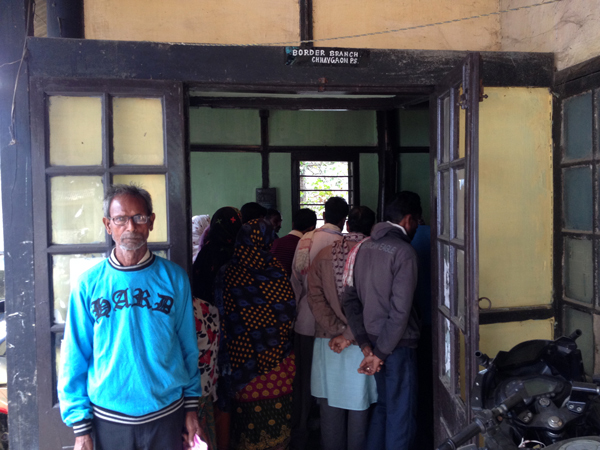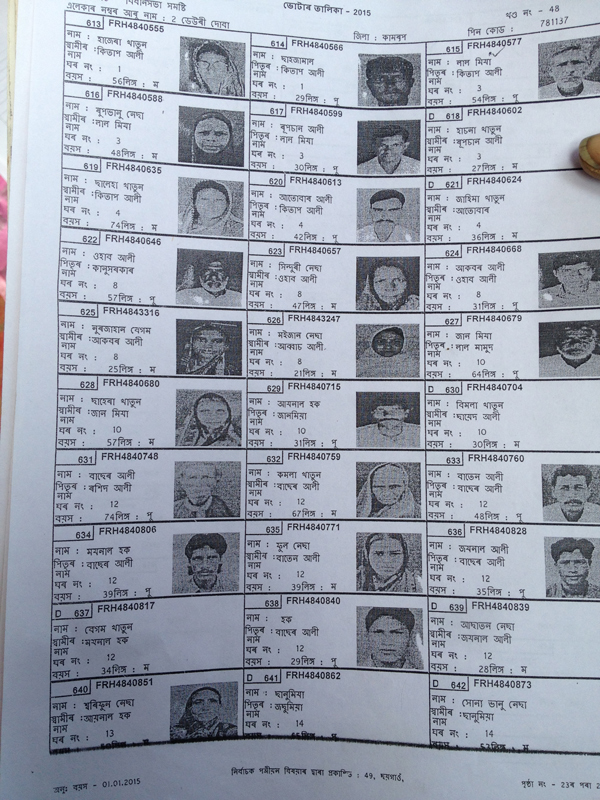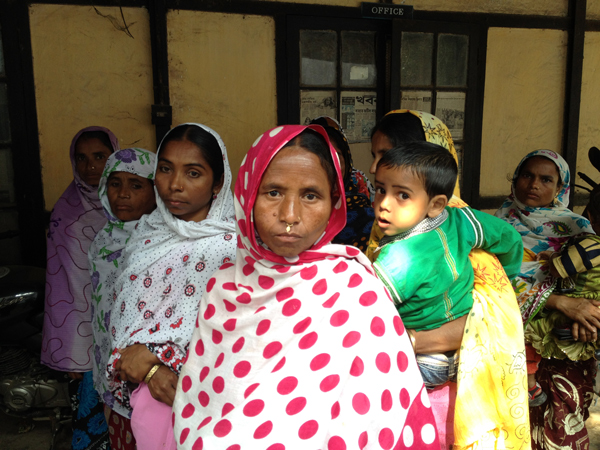
- Doubtful voters are those whose citizenship is under a cloud
- There are 1.5 lakh such people in Assam
- This includes both Bengali Muslims and Hindus
- What are the concerns of the doubtful voters?
- Why they fear the BJP
“I can tell you everything you want to know about D voters in Assam,” Fazalul Hoque, a lawyer told this reporter confidently. “That is because I was myself a D voter,” he continued as he chewed Tamul, the raw betelnut eaten with a pinch of lime and betel leaf, an integral part of Assamese culture.
Hoque was, however, lucky. His case came up relatively faster in the Foreigner Tribunal and he managed to convince the adjudicating officer, a person of the rank of a judge that he was indeed a citizen of India.
His parents, however, still remain on the list with 1.5 lakh others in the state, whose citizenship claims remain under a cloud.
Hoque practices at the district court in Barpeta, a Muslim majority district in Lower Assam. “I live in neigbouring Baksa and come here everyday to practice,” he said as he gently settled on his seat in a big hall which serves as the common chamber for many lawyers like him. There are no separate cabins or rooms.
Hoque was declared a D Voter, or doubtful voter, in 1998. “The world came down crashing. I was deprived of all my fundamental rights,” he said. “Suddenly, I realised that I could not caste my vote,” Hoque continued. “You don't realise the trauma of being a D Voter, unless you go through it,” he explained.
“We have been living in Baksa since 1965. I was born there and even then they declared us as if we were illegal immigrants,” he points out.
D Voters include not just Muslims but also a sizeable number of Bengali speaking Hindus, who are suspected to have come to India after 1971. “It is just a ruse to harass the Bengali speaking linguistic minority,” Hoque says.
Interestingly, the BJP government at the Centre had issued a notification that minority Hindus from neighbouring countries including Bangladesh who have migrated because of religious persecution at the hands of Islamists will be allowed long term visas which will pave way for their citizenship. While the decision irked the indigenous Assamese, it has come as a good news for the Hindu migrants from Bangladesh.
“In the Durga Rani Das case, the High Court judge had asked the state government to consider the new notification,” Arghdeep Saha, a lawyer at the Barpeta court informed. A considerable number of Bengali speaking Hindus have been declared as D voters in Assam especially in Barak Valley.

Alleged infiltration
The indigenous Assamese claim that all the minority dominated districts like Goalpara, Dhubri, Barpeta and so on is where the infiltration from Bangladesh still continues unabated. They claim that the Bangladeshis enter the country through the porous border and its easily get the fake documents after bribing the local officials. The many river islands or Chars, is where, they claim, that the illegal immigrants settle down undetected from the prying eyes of the police or the local administration.
“If they take the river to enter, it is difficult to recognise who is an Indian from this area and who is a Bangladeshi. We look the same. It is the same region after all,” says Diganta Barah, SP Dhubri.
“It is really difficult to police these areas because of their location,” Barah points out. He says that the police has been able to detect very few cases of infiltration.
“There were less than 10 cases of fresh infiltration and the police managed to apprehend less than 20 Bangladeshis last year,” he points out while adding that they will be tried under the IPC and not the Foreigners Act. Dhubri and Barpeta, both have between 20,000 and 30,000 D Voters each.
The people living on these Chars claim that they are being unfairly targeted. “Why do you have only D Voters in Assam? Is it the only state which shares a border with another country,” asks a primary school teacher who travels everyday to Basani Char part two, which falls in the Dhubri constituency.
In December 2015, this reporter met some D Voters at the Border Office at the Chhayagaon Police Station, half an hour drive from Guwahati.
They had come to complain that they are yet to get notices from the Foreigners Tribunal which was required for them to put up their defence to prove their antecedents.
The 65-year-old Sanu Miya, says his village Deoriduba used to be on the mainland and has turned into an island owing to erosion by the Brahmaputra. Miyan works as a labourer. Miyan says he was notified as a D voter even though his father's name figures in the 1951 National Register of Citizenship. He claims that he never got any notice nor did any election department official came to verify his documents.
Miyan, who happens to belong to the below poverty line group, says that there are 35 other D voters in his village. His wife also happened to be a D Voter, but she died two years ago. Miyan says, his son, who moved to Guwahati and works as a plumber is a voter in the Assamese capital.
Meanwhile, the clerk at the border office took down his complaint promising swift action. A local lawyer informs Catch that nothing has happened since because of the workload on the Tribunals.
Interestingly, after the Supreme Court order in December 2014, which directed the state government to identify all illegal immigrants and initiate proceedings against them, the number of foreign tribunals have gone up considerably. This will speed up the process of serving notice to the doubtful voters. The number of foreign tribunals in Dhubri for example has now gone up to ten.
Meanwhile, lawyers who have been taking up cases of 'D Voters' claim that even the ones who get notices are sometime branded as foreigners because they don't turn up at the tribunals. “A lot of cases are being decided against these individuals because they don't turn up at the tribunals. Many a time they are confident that no harm will come to them because they feel that they have all the documents,” says Aman Wadud, a lawyer. “Many of them do not turn up because of poverty and the expenses involved,” he says.
Wadud points out the case of Moinul Mullah. While Mollah’s parents and grandparents have been declared citizens of India and have all the documents, Mollah continues to be in the detention camp in Goalpara and faces deportation. The deportation has been stayed by the Court temporarily. “He is one of those who did not go to the tribunal and they decided his case ex-party,” Wadud claims. The tribunals have declared around 38,000 people as illegal immigrants in Assam. Many of those have reportedly gone missing while others have been rounded up at put in several detention camps.

BJP's offensive
Recent utterances by the BJP leaders have created fears in the minds of Bengali speaking minorities in the state. Himanta Biswa Sarma, the powerful former Congress leader who joined the BJP has been particularly vociferous in his campaign speeches targetting the illegal immigrants. “Recently, he said that the cut-off for citizenship will be the 1951 NRC and not March 1971,” says Hafeez Ahmad, an activist. Ironically, Sarma was the Assam Accord Implementation minister in the Congress government. The Accord puts 25 March, 1971 as the cut-off date.
Some are also worried after a recent decision by Judges Committee which said that even the families of D Voters are not eligible for the ongoing National Register of Citizenship exercise till their names are cleared. “Initially the Supreme Court said that only those who have been marked as D voters will be excluded. Now they have excluded the families as well,” says Nasiruddin from Howli town in Barpeta.

Prateek Hajela, the state co-ordinator for the NRC in Assam confirmed this development. “Yes, the Judges committee appointed by the Supreme Court has recommended that the families will not be included. However, we have sent it to the Registrar General for a final decision,” Hajela told Catch. He also mentioned how a substantial number of people have provided them fake certificates for the updation of their names in NRC. “We are investigating it and it will take 3-4 more months,” Hajela informed.
“It is a matter of survival for us. We will be branded as illegal immigrants if the BJP comes to power” says Ismail Hussain who suffered a bullet injury in a police firing during a protest against the NRC pilot project in Barpeta in 2010.
Edited by Aditya Menon
First published: 10 April 2016, 12:23 IST

![BJP's Kapil Mishra recreates Shankar Mahadevan’s ‘Breathless’ song to highlight Delhi pollution [WATCH] BJP's Kapil Mishra recreates Shankar Mahadevan’s ‘Breathless’ song to highlight Delhi pollution [WATCH]](https://images.catchnews.com/upload/2022/11/03/kapil-mishra_240884_300x172.png)

![Anupam Kher shares pictures of his toned body on 67th birthday [MUST SEE] Anupam Kher shares pictures of his toned body on 67th birthday [MUST SEE]](https://images.catchnews.com/upload/2022/03/07/Anupam_kher_231145_300x172.jpg)






